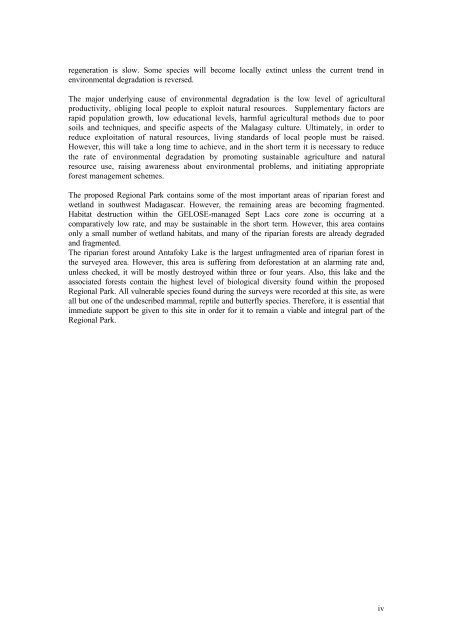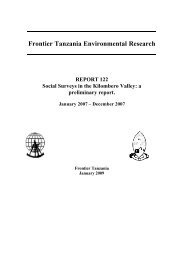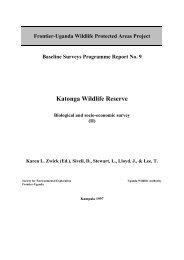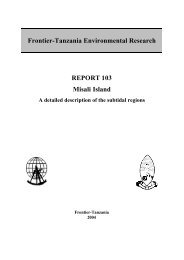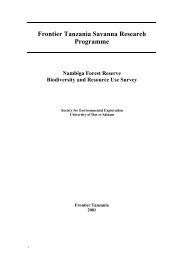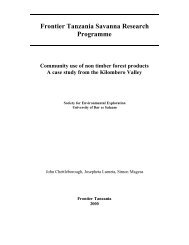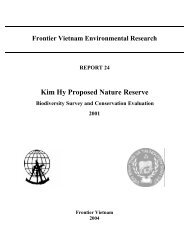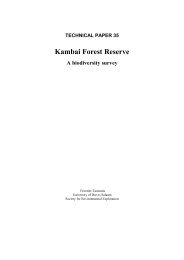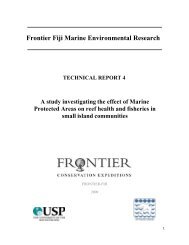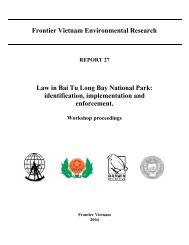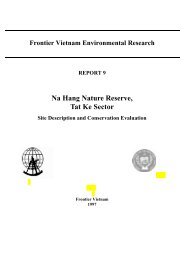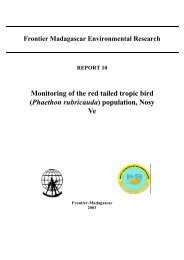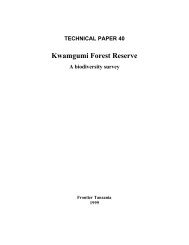The proposed Parc Regional de Belomotse - Frontier-publications ...
The proposed Parc Regional de Belomotse - Frontier-publications ...
The proposed Parc Regional de Belomotse - Frontier-publications ...
Create successful ePaper yourself
Turn your PDF publications into a flip-book with our unique Google optimized e-Paper software.
egeneration is slow. Some species will become locally extinct unless the current trend in<br />
environmental <strong>de</strong>gradation is reversed.<br />
<strong>The</strong> major un<strong>de</strong>rlying cause of environmental <strong>de</strong>gradation is the low level of agricultural<br />
productivity, obliging local people to exploit natural resources. Supplementary factors are<br />
rapid population growth, low educational levels, harmful agricultural methods due to poor<br />
soils and techniques, and specific aspects of the Malagasy culture. Ultimately, in or<strong>de</strong>r to<br />
reduce exploitation of natural resources, living standards of local people must be raised.<br />
However, this will take a long time to achieve, and in the short term it is necessary to reduce<br />
the rate of environmental <strong>de</strong>gradation by promoting sustainable agriculture and natural<br />
resource use, raising awareness about environmental problems, and initiating appropriate<br />
forest management schemes.<br />
<strong>The</strong> <strong>proposed</strong> <strong>Regional</strong> Park contains some of the most important areas of riparian forest and<br />
wetland in southwest Madagascar. However, the remaining areas are becoming fragmented.<br />
Habitat <strong>de</strong>struction within the GELOSE-managed Sept Lacs core zone is occurring at a<br />
comparatively low rate, and may be sustainable in the short term. However, this area contains<br />
only a small number of wetland habitats, and many of the riparian forests are already <strong>de</strong>gra<strong>de</strong>d<br />
and fragmented.<br />
<strong>The</strong> riparian forest around Antafoky Lake is the largest unfragmented area of riparian forest in<br />
the surveyed area. However, this area is suffering from <strong>de</strong>forestation at an alarming rate and,<br />
unless checked, it will be mostly <strong>de</strong>stroyed within three or four years. Also, this lake and the<br />
associated forests contain the highest level of biological diversity found within the <strong>proposed</strong><br />
<strong>Regional</strong> Park. All vulnerable species found during the surveys were recor<strong>de</strong>d at this site, as were<br />
all but one of the un<strong>de</strong>scribed mammal, reptile and butterfly species. <strong>The</strong>refore, it is essential that<br />
immediate support be given to this site in or<strong>de</strong>r for it to remain a viable and integral part of the<br />
<strong>Regional</strong> Park.<br />
iv


